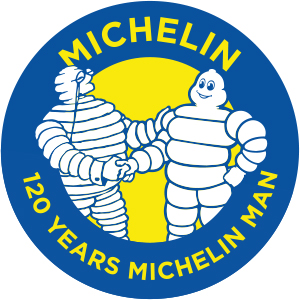Michelin maintains position as world’s most valuable tyre brand: Brand Finance
 A handshake that spans 120 years – the original Bibendum greeting his 2018 counterpart
A handshake that spans 120 years – the original Bibendum greeting his 2018 counterpart
Tyre sector brand value ‘deflates across board’
Michelin has defended its title as the world’s most valuable tyre brand despite a 9 per cent decrease in brand value to US$7.2 billion, according to the latest report by leading independent brand valuation and strategy consultancy, Brand Finance.
In addition to calculating overall brand value, Brand Finance also determines the relative strength of brands through a balanced scorecard of metrics evaluating marketing investment, stakeholder equity, and business performance. Along with the level of revenues, brand strength is a crucial driver of brand value.
This year, Michelin also retains its title as the world’s strongest tyre brand with a Brand Strength Index (BSI) score of 86.30 out of 100 and a rating of AAA. Michelin is the only brand in the ranking to score a AAA rating and its BSI is well clear of second ranked Bridgestone, with a BSI of 78.10 out of 100.
Tyre sector suffers
Over the last year, the tyre sector has suffered significantly, reflected in the rankings with seven out of ten tyre brands losing in brand value, notably: Continental (brand value down 28 per cent to US$3.4 billion), Goodyear (down 10 per cent to US$1.9 billion) and Hankook (down 8 per cent to US$1.5 billion). This trend can be attributed to market uncertainties and a drastic change in customer demands. China, the world’s biggest car market has experienced a sharp downturn in car sales, which saw a decline in 2018 for the first time in 20 years. Additionally, consumer behaviour has shifted, with more customers favouring retreading as opposed to brand new purchases. Retread tyres are growing in popularity thanks to their cost efficiency, environmental friendliness and quality performance. This has of course meant that industry margins have taken a huge dent. The imposing threat of American restrictions on foreign import competitors is also a matter of concern, as the industry prepares itself for President Trump’s proposed 25 per cent tariffs.
Alex Haigh, director, Brand Finance commented: “Brands in the replacement auto-parts industry – from tyre component makers to local garages – are bracing themselves for President Donald Trump’s tariffs on imported Chinese materials and goods. Hefty levies have already amplified the costs of steel and aluminium products, and more tariffs could affect a whole range of other items these companies develop and sell. The bulk of this will be felt in the year ahead by those dealing in tyres, rear-view mirrors and windshield wipers.”
Pirelli, Sumitomo buck trend
Italy’s Pirelli and Japan’s Sumitomo are the only two tyre brands in the rankings to see noteworthy increases in brand value, up 6 per cent to US$1.6 billion and up 33 per cent to US$801 million respectively.
Pirelli and Sumitomo’s strong performances are driven by their commitment to diversification and efforts to differentiate their brands from competitors. Sumitomo has significantly increased its sales revenue over the last year, reporting a 16 per cent rise, which has been boosted by the acquisition of UK-based wholesaler Micheldever Tyre Services Ltd, in a further boost to its European offering. Sumitomo has also been working with Dunlop (brand value up 1 per cent to US$2.0billion) to open a new European Development Centre focused on product innovation and tyre development.
Pirelli has positioned itself as a premium and powerful brand, renowned for its partnership with the Formula One World Championships to sponsoring wider sporting events including football, baseball and sailing. This strategic diversification combined with its strong Italian heritage has resulted in the successful differentiation from its competitors, and thus a boost in brand value.
Brand Finance defines brand value as the net economic benefit that a brand owner would achieve by licensing the brand in the open market. Brand strength is the efficacy of a brand’s performance on intangible measures relative to its competitors.



Comments